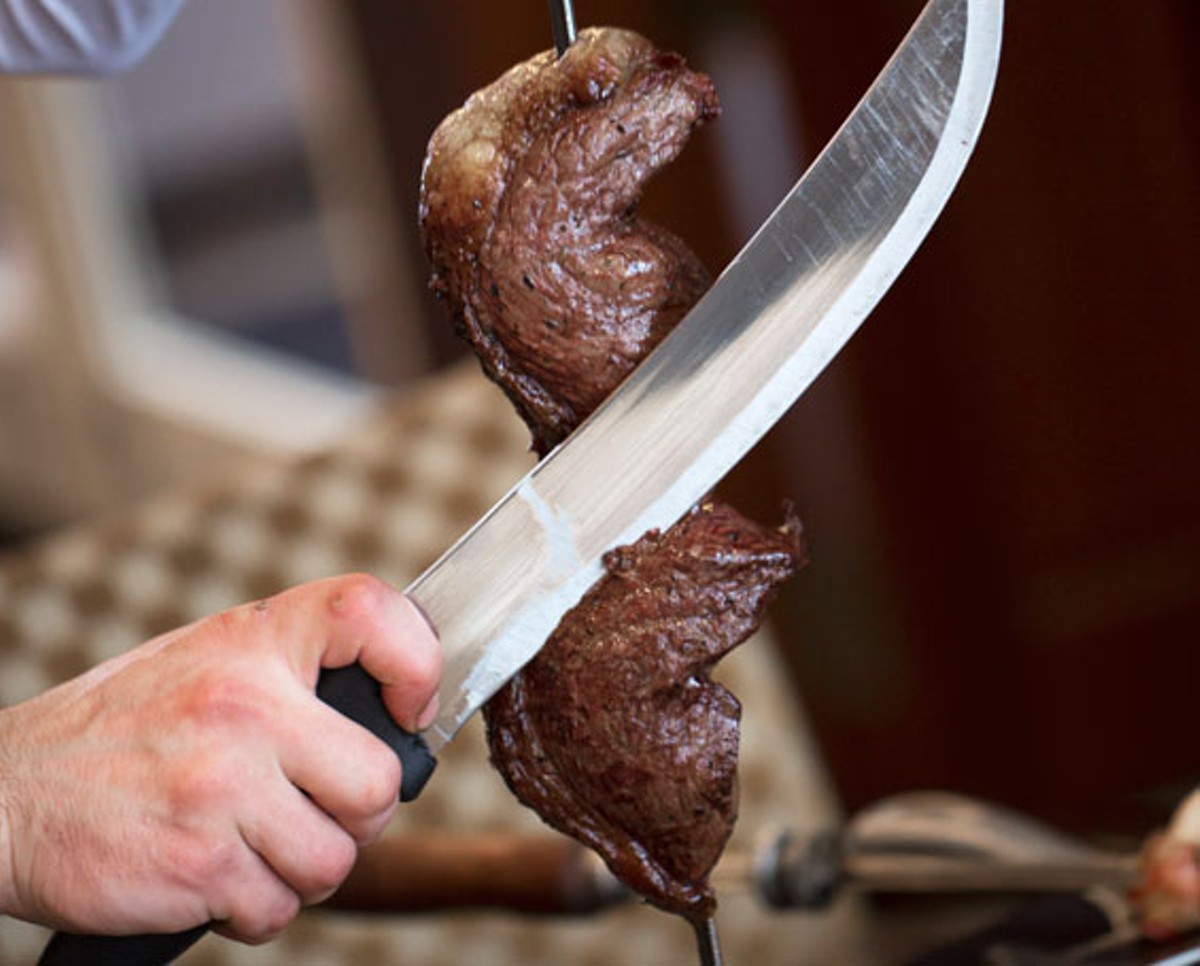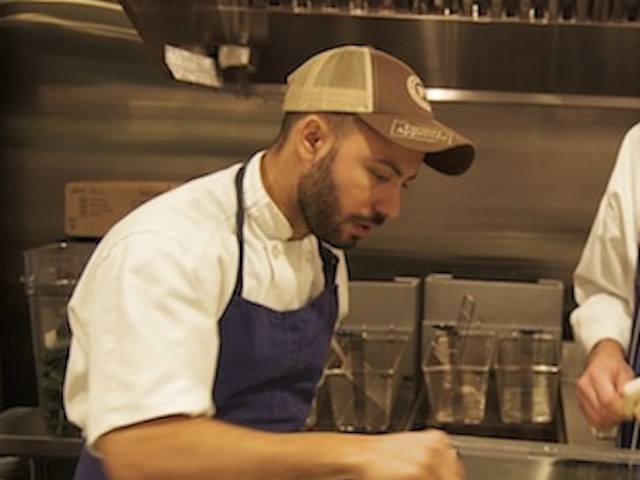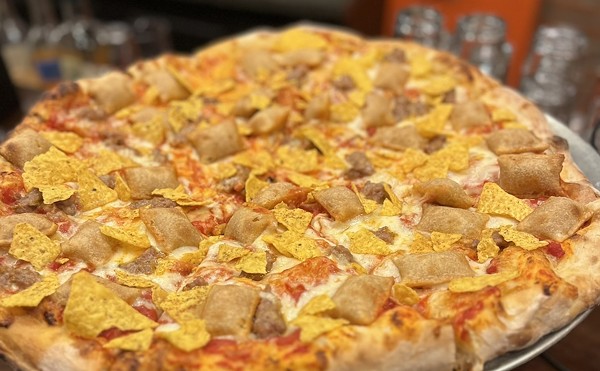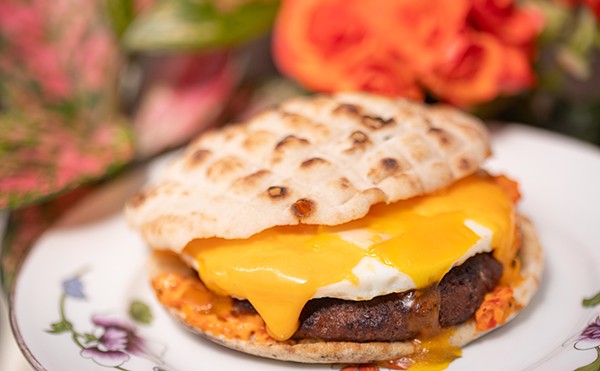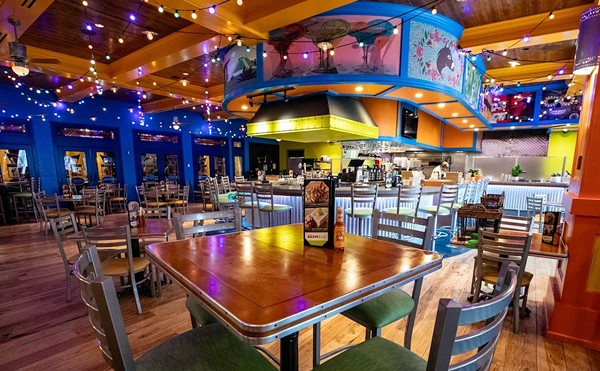It was bitterly cold when I left Brazikat Brazilian Steak & Seafood House, and I wanted nothing more than to retire to the warmth of my living room, a glass of bourbon in hand, my faithful dog curled at my feet. So preoccupied was I with this scenario that I didn't notice the old man standing in my path. I write "standing," but truly, he was hunched forward at the waist, and that only with great effort. What's more, his shoulders were stooped and his head curled so that he appeared to be studying a spot at the center of his sunken chest.
He looked like nothing so much as a living comma splicing the darkness. He wore a red vest over a black shirt. The flared cuffs of his black gaucho pants revealed that he wore no socks under his dress shoes, which themselves were poor specimens, the leather cracked, the soles uneven. A miasma of mesquite smoke lingered about his person.
"I'm sorry," I said out of habit. "I don't have any cash."
"I do not want or need your charity. Indeed, I have something to give you."
I saw now that in his hands — skeletal, palsied — he held some papers, three or four sheets ripped from a loose-leaf notebook. These he pressed into my own hands, saying, "Take these and read. If you think my story worth sharing, do so. But soon. There is not much time."
Should I have politely accepted the papers, folded them into my pocket, dismissed them as the ravings of a madman? Perhaps. But curiosity has always gotten the better of me, and as I walked back to my car, by the light of my cell phone, I began to read.
Even before I finished the first of his pages, I knew I must go back and find the strange old man. But by the time I returned to where I'd seen him, he had gone. The only trace was the faint scent of mesquite, now just a warm hint in the icy wind. And then I saw, beyond the restaurant, at the far end of the street, dancing along in the whipping winter wind, an empty pair of black gaucho pants.
Those were his pants. This is his story.
So very far have I traveled from the Serras de Sudeste, where as a child I gamboled with my older brothers over the rolling grasslands, weaving paths amid the pleasant, docile cattle (though not their omnipresent dung), while my mother patrolled the herd, proud, regal, on horseback, as her father and his father before him had done. (My own father chased the rumor of fugitive Nazi war criminals into the rainforest and was never seen or heard from again.)
I thought myself destined for a life on the pampas; indeed, when I came of age and my mother presented me with my very own pair of gaucho pants, I wept with joy. Yet fate had something else in store for me: a woman, a beautiful tourist from America who caught my eye and then, as we lay beside a roaring campfire, while the cattle lowed in eerie unison, perhaps at the majesty of the evening, or perhaps because I was roasting the rump of one of their brethren on a spit above the campfire, captured my heart.
She told me not to follow her back to the United States, yet I could not resist her ravishing red hair and muscular buttocks. When I called her from the airport, she said she couldn't see me...she had a husband, our time together had been nothing more than a fling. I wandered the terminal in despair. I had no money. I had nothing but the clothes on my back (including my beloved gaucho pants) and a copy of the in-flight magazine. I paged through this out of desperation, and there I found fate's true message: an ad for Fogo de Chao, a churrascaria.
Thus began my long career as a waiter in Brazilian steak houses, where thanks to my skill with the blade and my ease of manner with guests, I came to be known simply as the Gaucho. I traveled this great country from coast to coast, helping to open new churrascarias, instructing novices in the Way of the Gaucho (and bedding the occasional hostess). Even as time caught up with me, as my gaucho pants sagged around my ever-frailer form, I could not resist my calling — which is how I came to Clayton, Missouri, in November of last year to help open this Brazikat. The owner, Sam Barakat, owns a churrascaria in Valparaiso, Indiana, but I thought my experience could benefit his establishment.
I did not know the half of it.
Where to begin? With what I know the best: the Way of the Gaucho. The young would-be gauchos at Brazikat are not swordsmen. They banter about their ninja-like prowess, but one cuts a piece of top sirloin so clumsily that the entire hunk of meat falls from the skewer onto the diner's plate, splashing its juice on the table. Another has a knife so dull that he can't separate a single pork rib from its rack and abandons his work, telling the diner, "Why don't you just take the whole thing."
(Clumsy as it may be, as an act of generosity, such a gesture stumbles into the general vicinity of the Way of the Gaucho. Perhaps there is hope yet for these servers. Attempting to minimize diners' agony is in itself a noble aim worthy of a gaucho.)
The kitchen grills the meats over a mesquite-wood fire. I have no quarrel with this in theory, but at Brazikat every piece of meat — top sirloin, filet wrapped in bacon, the fabled picanha (the same fatty rump cut I prepared for my American temptress so long ago), chicken wrapped in bacon, pork ribs, pork tenderloin, prime rib — tastes of mesquite and nothing else. The flavor lingers on your tongue for hours, as bitter as a jilted lover.
Whichever mesquite meat you try, the gauchos cannot ensure a consistent cut. Your picanha might be luscious or it might have the texture of tree bark. A thick slice of prime rib might be 50 percent fat.
The less said about the seafood, the better. I shudder to think that Brazikat might convince a diner new to the churrascaria experience that ahi tuna (encrusted in inedibly salty Cajun (Cajun!) spices) and salmon (overcooked to the point where it tastes like low tide) are Brazilian. The Parmesan shrimp — I awaken in the middle of the night from nightmares about the Parmesan shrimp.
There are "Muscles Marinara."
(The American palate never ceases to amaze me, but I want no part of this dish.)
Often, I am simply embarrassed at Brazikat. The "Brazilian Mashed Potatoes," flavored with cheddar cheese and paprika, that accompany your meal are no more a part of this Brazilian's life than our supposed fondness for waxing — and are approximately as appetizing. The caramelized bananas, another accompaniment, which the other gauchos insist upon as palate cleansers, do nothing of the sort. The "35-Item Gourmet Food Bar" is but a salad bar with random additional items (pasta salad, soup, a chicken stir-fry). I do not think the number of items equals 35, though I confess I'm unsure if I should count the two containers of identical croutons separately.
Perhaps I should overlook these flaws. I am old now. It is time for a new generation of gauchos to find a new way in the world. Yet the fact that diners are paying $39.95 for the all-you-can-eat meat dinner, $59.95 for the combined all-you-can-eat meat and seafood dinner, enrages me, and for a moment I feel as young and full of fire as that day when my mother first handed me my gaucho pants.
This Brazikat is too cynical an operation for this gaucho. Besides, I have done my part for the churrascaria arts. These gaucho pants — they do not fit me any longer.
Slideshow: Inside Brazikat Brazilian

